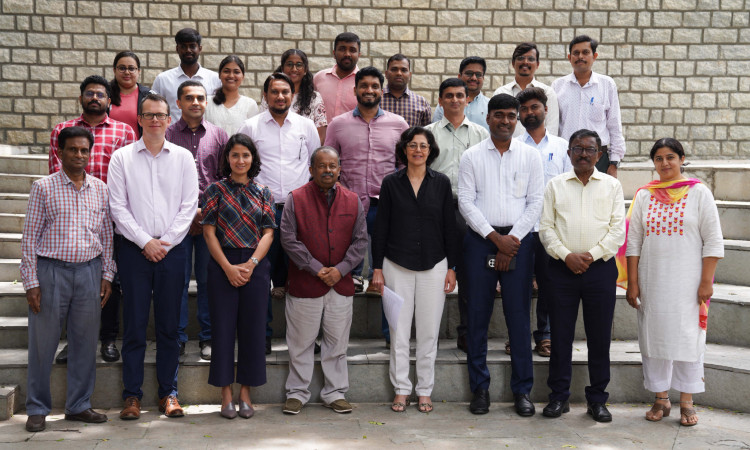IIMB, World Bank and RDWSD hosted a focused discussion on ‘Challenges and Solutions for Sustainable Water Supply’ on June 19

The session explored key issues in rural water governance and strategies for sustainable, equitable water access
20 JUNE, 2025: The Jal Jeevan Mission (JJM) at IIMB, in collaboration with the World Bank Team and the Rural Drinking Water and Sanitation Department (RDWSD), Government of Karnataka, hosted a focused discussion on ‘Challenges and Solutions for Sustainable Water Supply’ on June 19, 2025, at IIMB.
The event began with a welcome address and opening remarks by Prof. Gopal Naik, Chairperson, JJM at IIMB, who set the context by emphasising the growing need for collaborative, evidence-based solutions to strengthen rural water supply systems.
Mr. Jafar Shareef Sutar, Deputy Secretary (Admin), RDWSD, Government of Karnataka, shared key initiatives currently being implemented by the department to improve infrastructure, enhance service delivery, and promote institutional coordination for reliable and inclusive access to drinking water in rural regions.
The World Bank team, led by Sumila Gulyani, Water Practice Head, South Asia, along with Kristoffer Welsien, Mariappa Kullappa, and Aroha Bahuguna, presented their observations on ensuring sustainability in rural water services. The team stressed that reliable access to water requires not just physical infrastructure, but robust operational systems, continuous capacity building, behavioural change, and strong local technical leadership.
Setting the tone for deeper collaboration, the session facilitated dialogue between policymakers, development practitioners, and researchers on practical solutions to address on-ground challenges especially those related to Operation and Maintenance (O&M), governance structures, and data-driven decision-making. This event marked another milestone in IIMB’s efforts to foster impactful dialogue on public policy and rural development through multi-stakeholder engagement.
IIMB, World Bank and RDWSD hosted a focused discussion on ‘Challenges and Solutions for Sustainable Water Supply’ on June 19
The session explored key issues in rural water governance and strategies for sustainable, equitable water access
20 JUNE, 2025: The Jal Jeevan Mission (JJM) at IIMB, in collaboration with the World Bank Team and the Rural Drinking Water and Sanitation Department (RDWSD), Government of Karnataka, hosted a focused discussion on ‘Challenges and Solutions for Sustainable Water Supply’ on June 19, 2025, at IIMB.
The event began with a welcome address and opening remarks by Prof. Gopal Naik, Chairperson, JJM at IIMB, who set the context by emphasising the growing need for collaborative, evidence-based solutions to strengthen rural water supply systems.
Mr. Jafar Shareef Sutar, Deputy Secretary (Admin), RDWSD, Government of Karnataka, shared key initiatives currently being implemented by the department to improve infrastructure, enhance service delivery, and promote institutional coordination for reliable and inclusive access to drinking water in rural regions.
The World Bank team, led by Sumila Gulyani, Water Practice Head, South Asia, along with Kristoffer Welsien, Mariappa Kullappa, and Aroha Bahuguna, presented their observations on ensuring sustainability in rural water services. The team stressed that reliable access to water requires not just physical infrastructure, but robust operational systems, continuous capacity building, behavioural change, and strong local technical leadership.
Setting the tone for deeper collaboration, the session facilitated dialogue between policymakers, development practitioners, and researchers on practical solutions to address on-ground challenges especially those related to Operation and Maintenance (O&M), governance structures, and data-driven decision-making. This event marked another milestone in IIMB’s efforts to foster impactful dialogue on public policy and rural development through multi-stakeholder engagement.
